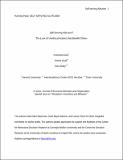Self-serving Altruism? The Lure of Unethical Actions That Benefit Others
Published Version
https://doi.org/10.1016/j.jebo.2013.04.005Metadata
Show full item recordCitation
Gino, F., S. Ayal, and D. Ariely. "Self-serving Altruism? The Lure of Unethical Actions That Benefit Others." Journal of Economic Behavior & Organization (forthcoming).Abstract
In three experiments, we propose and find that individuals cheat more when others can benefit from their cheating and when the number of beneficiaries of wrongdoing increases. Our results indicate that people use moral flexibility to justify their self-interested actions when such actions benefit others in addition to the self. Namely, our findings suggest that when people's dishonesty would benefit others, they are more likely to view dishonesty as morally acceptable and thus feel less guilty about benefiting from cheating. We discuss the implications of these results for collaborations in the social realm.Terms of Use
This article is made available under the terms and conditions applicable to Open Access Policy Articles, as set forth at http://nrs.harvard.edu/urn-3:HUL.InstRepos:dash.current.terms-of-use#OAPCitable link to this page
http://nrs.harvard.edu/urn-3:HUL.InstRepos:10996792
Collections
- HBS Scholarly Articles [854]
Contact administrator regarding this item (to report mistakes or request changes)



